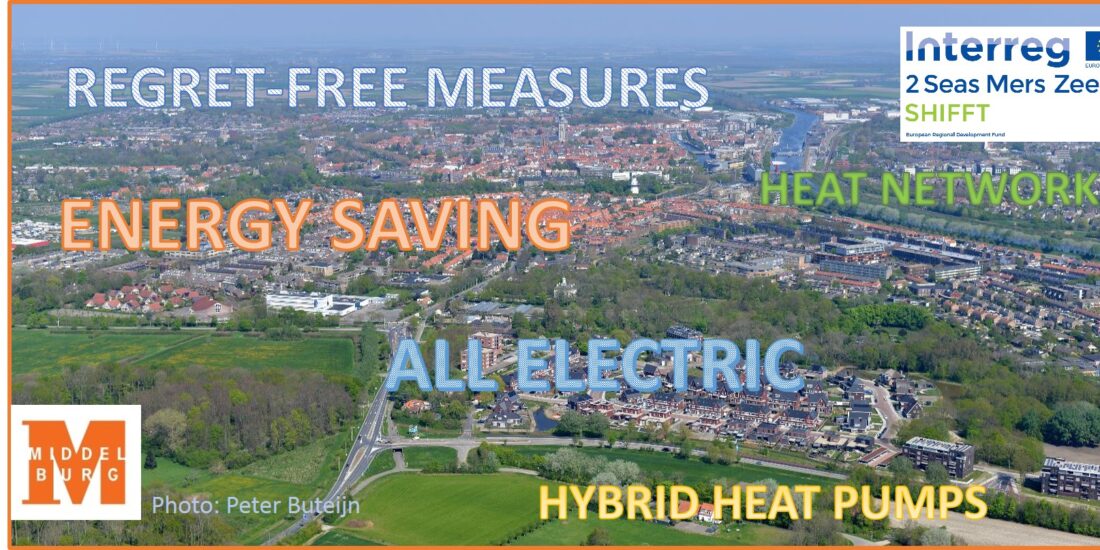Heat Strategy – regional cooperation and participation in Zeeland, the Netherlands
All Dutch municipalities* must have their Vision for the Heat Transition in place by the end of this year. This ‘Heat Strategy’ will describe how homes within the municipality will switch from natural gas to a renewable energy source. The overall aim is a rapid reduction in CO2 emissions from homes and other buildings to combat climate change. Our participation in the EU Interreg 2 Seas SHIFFT Project is a perfect fit with this national and municipal objective.
In Middelburg, the principles of European and regional cooperation along with resident participation are important in drawing up the Heat Strategy.
The Heat Strategy describes the best alternative to natural gas by district and by type of home. It also outlines how we are going to realise a step-by-step approach to the heating transition, the so-called transition path. The costs, both for the residents and for society as a whole, are taken into account. The Heat Strategy is a dynamic document, and as such, will be updated every few years with the latest knowledge and insights.
Newer properties and well-insulated homes require a different solution to older and heritage buildings. Possible solutions could be an individual heat pump, or connection to a heat network supplied by residual heat from industry. For some buildings the solution is clear, in other cases the focus is first on making the homes “transition-ready”, such as improving the insulation. We will then consider the best alternative to natural gas at a later stage. We have until 2050 to get this done!
Collaboration
In Middelburg, we started drawing up the Heat Strategy in 2020. Of course, we are not doing this in isolation. As a direct result of our involvement in the EU Interreg 2 Seas SHIFFT Project, we are able to integrate our learning and increased understanding of the sustainable heating transition from our collaborative work with other municipalities and Universities based in the Netherlands, Belgium, France and the UK, who are addressing the same climate change challenges.
There is also local cooperation. Our Heat Strategy links to the Regional Energy Strategy (RES) for the province of Zeeland. Our neighbouring municipalities in Zeeland are all working on their own vision, but some possible solutions transcend municipal boundaries. For example, together with neighbouring municipalities, we will undertake further research into the construction of a joint heat network, to which several companies can supply residual heat. This will be used to provide district heating for neighbourhoods in different municipalities.
Additionally, it is useful to exchange knowledge and coordinate approaches with regard to similar types of homes under similar conditions. The Zeeland municipalities hold monthly meetings about the joint approach to the heat transition. Recently, we agreed that the municipalities cooperate in their approach to similar target groups, e.g. insulating similar home types, and organising a joint procurement campaign.
Participation
Whilst it is the municipalities who are tasked with putting the vision on paper, residents are crucial to the process and the implementation. Ultimately, they have to take action to make their homes natural gas-free. Consequently, residents have been involved in drawing up the vision from the start and are regularly given the opportunity to respond to the plans. On June 3rd, we organised an online information evening for all residents in Middelburg. We are also looking for the ‘early adopters’, whom we will invite to inspire their neighbours with the measures they have taken and their experiences with these measures.
Towards implementation
Based on various calculation models, a map with different transition paths for the Municipality of Middelburg was drawn up. We then discussed the results with several stakeholders, such as the grid operator, a social housing corporation and a group of residents, in order to arrive at a realistic and achievable strategy.
It is important for the climate to start as soon as possible, despite the fact that there are still many uncertainties, e.g. financing. In the short term, therefore, we will focus on regret-free measures, i.e. improvements to the homes that will immediately lead to energy savings and increased comfort. For homes that are transition ready (built after 2005), we will focus on encouraging a full-electric solution when the central heating boiler needs to be replaced. To achieve this, we will embrace the cooperation with our neighbouring municipalities and the SHIFFT Project Partners!
*Municipality A municipality in this context is the local government. In the Netherlands there is the State, then 12 Provinces (Middelburg is in Zeeland), and the Province of Zeeland is divided into 13 municipalities. The municipality of Middelburg consist of the city Middelburg and a few villages around it.


